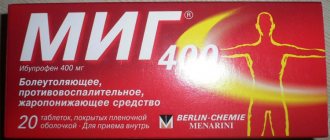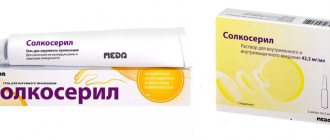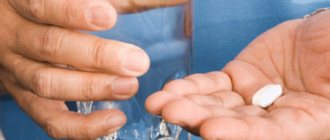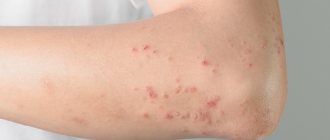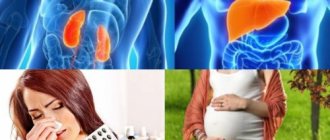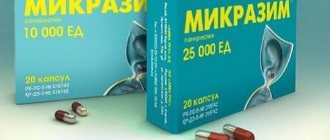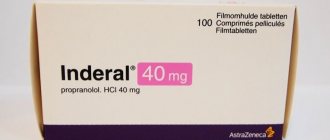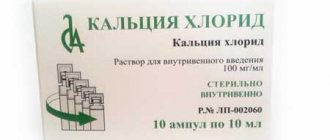Release form and composition
Dosage forms of release of Neuleptil:
- Capsules: size No. 4, gelatin hard, opaque, white, capsules contain yellow powder, practically odorless (10 pieces in blisters, 5 blisters in a cardboard box);
- Oral solution: transparent, yellow-brown, fluorescent, has a mint odor (30 or 125 ml in dark neutral glass bottles (type III), 1 bottle in a cardboard box complete with a dropper (30 ml each) or a plastic syringe - dispenser (125 ml each)).
1 capsule contains:
- Active substance: periciazine – 10 mg;
- Auxiliary components: calcium hydrogen phosphate dihydrate – 137 mg, magnesium stearate – 3 mg;
- Capsule shell: titanium dioxide (E171) – 3%, gelatin – up to 100% (total capsule weight – 150 mg).
The composition of 1 ml of solution includes:
- Active substance: periciazine – 40 mg;
- Auxiliary components: sucrose – 250 mg, ascorbic acid – 8 mg, tartaric acid – 16.5 mg, glycerin (glycerol) – 150 mg, peppermint leaf oil – 0.4 mg, ethanol 96% – 97.4 mg, caramel (E150d) – 2 mg, purified water – up to 1 ml.
Neuleptil (drops, tablets): instructions for use, reviews, price, side effects, INN, radar
Patients with mental disorders exhibit different behavioral reactions.
Some have virtually no external stimuli, others become violent at every little thing that a healthy person doesn’t even pay attention to.
To correct the level of aggressiveness and ensure safety in the environment, so-called behavior correctors are used in medicine.
Neuleptil belongs to the group of just such drugs.
Radar
Neuleptil, which belongs to the group of antipsychotics, is included in the system of medicines approved for use in the Russian Federation.
ATX code - N05AC01, registration number - P N014803/01-110110.
INN
The international nonproprietary name of the drug is Periciazine.
Compound
The neuroleptic is taken orally, regardless of the dosage form.
- The medicinal solution with the scent of mint is packaged in bottles (30 ml) equipped with a dropper.
- Capsules are placed in a blister of 10 units, one package contains 5 plates. The yellow powdery drug is contained in white gelatin capsules. When using the product, a specific taste and smell are not identified.
The basis of the chemical composition is pericyazine.
The dosage of the active component in capsules is 10 mg, in a medicinal solution (drops) – 40 mg.
The list of excipients that promote the rapid penetration of periciazine into the bloodstream and enhance its effect is different in each dosage form.
For the manufacture of tablets in production they use:
- calcium hydrogen phosphate dihydrate;
- titanium dioxide;
- Magnesium stearate.
The solution contains the following components:
- wine acid;
- glycerol;
- sucrose;
- peppermint leaf oil;
- ascorbic acid;
- ethanol;
- caramel;
- distilled water.
Pharmacology
The active substance of the drug blocks receptors (adrenergic, dopaminergic, serotonergic), as well as m-cholinergic receptors, as a result of which the activity of analgesics and other anesthetics is stimulated.
Neuleptil is used in therapy in different directions, which is ensured by the unique properties of the active component, which can have the following effects:
- antiemetic;
- antihistamine;
- hypnotic.
The complex action ensures a high therapeutic result of therapy.
The neuroleptic, entering the gastrointestinal tract, is absorbed into the systemic circulation, as a result of which it tightly binds to plasma proteins (up to 90%).
The maximum concentration of the active substance in the blood is reached a couple of hours after taking the dose.
Along with pericyazine, auxiliary components also take part in the metabolic process; inactive metabolites are excreted along with bile and feces.
Price
The main condition for dispensing a medicine is the presence of a prescription sheet .
It is prescribed by the attending physician. According to the rules for the sale of medicines, a prescription is issued in Latin.
The cost of the drug in capsules varies
from 242 to 290 rubles .
An antipsychotic is considered an affordable medicine; you can buy it either in a pharmacy or online.
Instructions for use
The antipsychotic is taken in strict compliance with the doctor’s instructions regarding the dosage and duration of therapy.
The tablets are swallowed whole, washed down with water. Drops can also be washed down with purified liquid.
Drops
The mint aroma and taste of the solution does not cause discomfort in adult patients and children.
The medicine must be taken orally. The daily dose is set individually (from 30 to 100 mg).
To obtain a pronounced effect, it can be increased to 200 mg.
The daily dose recommended by the doctor is divided into 2-3 doses.
Pills
A single dose involves taking 1-2 capsules (before meals).
The dosage is individual for each clinical case.
You need to drink the product with a sufficient amount of purified water (at least 150 ml). Tea, coffee and sweet drinks should not be used as liquid.
The daily dose can be taken once (in the evening) or divided into two doses (1/3 taken in the morning, 2/3 before bed).
Neuleptil during pregnancy and lactation
Studies to study the pharmacological properties of the antipsychotic were carried out on animals.
There is no analysis of the results regarding the effect of the active substance on fetal development, therefore only the assumptions of experts are taken into account. They are so contradictory that there is no point in creating threats to the health of the expectant mother and child by prescribing an antipsychotic.
In rare cases, a medicine is included in therapy if it is not possible to use an analogue. In this case, the minimum dose is used with a gradual reduction towards the due date.
There are also no study results regarding the penetration of the active substance Neuleptil into breast milk. If the need for therapy arises, lactation is artificially interrupted .
For children
Drops are prescribed to children from the age of three.
The daily norm corresponds to the range of 0.1-0.5 mg per kg of child weight. The tableted drug is not used in pediatrics.
Antipsychotics are contraindicated for children under 3 years of age.
Restrictions on use
Before using the product, you should carefully study the instructions.
The manufacturer indicates a list of pathologies for which a corrective drug is not prescribed.
Restrictions apply to the following clinical cases:
- Parkinson's disease;
- dysfunction of the prostate gland;
- angle-closure glaucoma;
- porphyria;
- agranulocytosis;
- liver/kidney dysfunction;
- diseases of the cardiovascular system;
- allergy to the substances in the composition.
Reviews
Irina, 38 years old:
Alexander, 49 years old:
Analogs
If the patient has a negative reaction to the components of the composition or two-week therapy does not give the desired result, the doctor makes changes to the treatment - selects another antipsychotic.
You can replace Neuleptil with means of a similar action:
- Periciazine is an absolute analogue and is produced in tablet form. The daily dose for adults is 1-2 tablets; for children, the dosage is calculated taking into account body weight.
- Thioril is an antipsychotic drug intended for behavior correction in adults and children (from 12 years of age). The active substance interferes with the functioning of the nervous system, suppresses irritability and nervousness. The daily norm is 25-600 mg.
- Thiodazine - the active substance is a phenothiazine derivative. The daily dose (25-200 mg) is divided into 2-4 doses after meals. Pharmacological properties are identical to those of Neuleptil.
Selecting an analogue on your own is strictly prohibited .
The process of searching for a substitute is carried out by the attending physician, who has a complete picture of the patient’s disease and is familiar with the characteristics of the body and related problems.
Source: https://psihbolezni.ru/lechenie/neuleptil-kapli-tabletki-instruktsiya-po-primeneniyu-otzyvy-tsena-pobochnye-dejstviya-mnn-rls/
Pharmacological properties
Neuleptil is characterized by antispasmodic, sedative, hypnotic, antipsychotic, and antiemetic effects on the body.
Pharmacodynamics
Periciazine is an antipsychotic that belongs to the group of piperidine phenothiazine derivatives, which have antidopaminergic activity. This explains the development of the therapeutic antipsychotic (there is no stimulant component) effect, as well as the hypothermic and antiemetic effects of the drug. However, antidopaminergic activity is also responsible for the occurrence of side effects from taking periciazine (hyperprolactinemia, movement disorders and extrapyramidal syndrome).
The antidopaminergic activity of the active substance Neuleptil is characterized by a moderate degree of severity, as a result of which it has a moderate antipsychotic effect in moderately severe extrapyramidal disorders. Periciazine blocks adrenergic receptors of the reticular formation, located in the brain stem, and central histamine receptors, which causes a noticeable sedative effect, which is considered a desirable clinical effect, especially in angry and maliciously irritable types of affect. At the same time, the decrease in aggressiveness is not accompanied by the development of inhibition and lethargy. Unlike chlorpromazine, periciazine is characterized by a more pronounced antiemetic, antiserotonin and central sedative effect, but a less pronounced antihistamine effect.
Periciazine reduces disinhibition, aggressiveness, and excitability, which proves its effectiveness in behavioral disorders. For this reason, it is known among experts as a “behavior corrector.”
The antiallergic properties of the drug are explained by the blockade of peripheral H1-histamine receptors. The consequence of blockade of peripheral adrenergic structures is its hypotensive effect. Neuleptil also exhibits anticholinergic activity.
Pharmacokinetics
After oral administration, pericyazine is well absorbed, but, like other phenothiazine derivatives, it is involved in intensive first-pass metabolism in the liver and/or intestines. This leads to the fact that the content of unchanged pericyazine in the blood plasma is less than with intramuscular administration and varies over a wide range.
After oral administration of 20 mg of Neuleptil (2 capsules), the maximum concentration of its active component in plasma is reached within 2 hours and is equal to 150 ng/ml (410 nmol/l).
Periciazine is approximately 90% bound to plasma proteins. At the same time, it intensively penetrates tissues and passes through histohematic (including blood-brain) barriers. Most of the substance is metabolized in the liver through conjugation and hydroxylation. Metabolites contained in bile can be reabsorbed in the intestine. The half-life of pericyazine varies from 12 to 30 hours, and the elimination of metabolites is an even longer process. Conjugated metabolites are excreted in the urine, and the rest of periciazine and its metabolites are excreted in feces and bile.
In elderly patients, the elimination of pericyazine and its metabolites slows down somewhat.
Directions for use and dosage
The specific dosage of the drug is prescribed taking into account the diagnosis and the age of the patient. The standard treatment regimen involves dividing the daily dose into 2 or 3 doses. In this case, it is recommended to focus on the evening hours.
The daily dosage of Neuleptil for adults varies from 30 to 100 mg. In some cases, solely at the discretion of the doctor, the dose may be increased to 200 mg/day.
For children over 3 years of age, the drug is prescribed taking into account the child’s weight - at the rate of 0.1-0.5 mg per kilogram of body weight per day.
Contraindications
Absolute:
- Angle-closure glaucoma;
- Parkinson's disease;
- Urinary retention due to prostate diseases;
- History of porphyria, agranulocytosis;
- Simultaneous use with levodopa;
- Hypersensitivity to the components of the drug.
Relative (caution is required when prescribing Neuleptil against the background of the following diseases/conditions):
- Diseases of the cardiovascular system;
- Kidney/liver failure;
- Old age (due to the likelihood of developing excessive hypotensive and sedative effects).
It is advisable to limit the duration of drug therapy in pregnant women. At the end of pregnancy, if possible, it is recommended to reduce the dose of Neuleptil simultaneously with corrective antiparkinsonian drugs that can potentiate the atropine-like effect of neuroleptics. After birth, the child needs to monitor the condition of the digestive and nervous systems.
Due to the lack of necessary data, the use of Neuleptil by nursing women is not recommended.
NEULEPTIL (solution): reviews
Greetings to everyone who reads my review. Neuleptil was prescribed to us by a neurologist when we were registering for kindergarten. We were 3.10. The child is hyperactive, with a pronounced attention deficit. That is, it is not that he lacks attention, but he cannot concentrate his attention, could not remember a certain sequence of actions, could not catch or remember the meaning of words (for example, I say, put on your pants, socks and shoes. For him this was beyond his power . I had to control every step, otherwise something would be missed. And when something doesn’t work out, he gets hysterical, throws everything, yells, can hide under the table and sit there. There were hysterics when he wanted to put on warm boots in the heat of 30 degrees, and I explain to him that it’s summer, not winter, but he wants winter and puts on a boot …
Side effects
As a rule, Neuleptil is well tolerated by patients, however, in some cases, disorders may develop, the severity of which is determined by the pharmacological properties of the antipsychotic.
At low initial doses, the following side effects may occur:
- Autonomic nervous system: orthostatic hypotension, anticholinergic effects such as constipation, dry mouth, urinary retention, accommodation paresis;
- Nervous system: drowsiness or sedation (usually more pronounced at the beginning of the course of therapy), apathy, mood changes, states of depression and anxiety.
According to the instructions, Neuleptil in higher doses can lead to the development of such disorders as:
- Nervous system: early dyskinesias (in the form of spastic torticollis, oculomotor crises, trismus, etc.), extrapyramidal disorders (in the form of akinesia, sometimes in combination with muscle hypertonicity (partially eliminated by prescribing anticholinergic antiparkinsonian drugs), motor agitation, akathisia , hyperkinesia-hypertonicity); with long-term treatment – tardive dyskinesia;
- Endocrine system and metabolism: impotence, frigidity, hyperprolactinemia (in the form of amenorrhea, galactorrhea, gynecomastia), weight gain, hyperglycemia, decreased glucose tolerance, thermoregulation disorders.
Disorders that occur in more rare cases and are not dependent on the dose taken:
- Skin reactions: photosensitivity, allergic skin reactions;
- Organ of vision: decreased tone of the eyeballs, brownish deposits in the anterior chamber of the eye associated with the accumulation of Neuleptil (as a rule, they do not affect vision);
- Hematopoietic system: rarely - agranulocytosis (regular monitoring of a general blood test is recommended), leukopenia.
There is also a possibility of the following side effects:
- Cholestatic jaundice;
- A positive serological test for the presence of antinuclear antibodies, not accompanied by clinical manifestations of lupus erythematosis;
- Neuroleptic malignant syndrome, manifested by unexplained fever, pale skin, hyperthermia and dysfunction of the autonomic nervous system (if these symptoms appear, therapy should be interrupted).
There have been isolated cases of sudden death (probably due to cardiac causes), as well as unexplained cases of sudden death.
Similar drugs:
- Eglonil Oral tablets
- Finlepsin Oral tablets
- Moditen depo Solution for intramuscular administration
- Egolanza Oral tablets
- Rispaksol Oral tablets
- Thiodazine Oral tablets
- Closasten (Closastene) Oral tablets
- Clopixol Depot Solution for intramuscular administration
- Thioridazine Oral tablets
- Leponex Oral tablets
** The Drug Directory is intended for informational purposes only. For more complete information, please refer to the manufacturer's instructions. Do not self-medicate; Before starting to use the drug Neuleptil, you should consult a doctor. EUROLAB is not responsible for the consequences caused by the use of information posted on the portal. Any information on the site does not replace medical advice and cannot serve as a guarantee of the positive effect of the drug.
Are you interested in the drug Neuleptil? Do you want to know more detailed information or do you need a doctor's examination? Or do you need an inspection? You can make an appointment with a doctor - the Euro lab is always at your service! The best doctors will examine you, advise you, provide the necessary assistance and make a diagnosis. You can also call a doctor at home . Euro lab clinic is open for you around the clock.
** Attention! The information presented in this medication guide is intended for medical professionals and should not be used as a basis for self-medication. The description of the drug Neuleptil is provided for informational purposes and is not intended for prescribing treatment without the participation of a doctor. Patients need to consult a specialist!
If you are interested in any other drugs and medications, their descriptions and instructions for use, information about the composition and form of release, indications for use and side effects, methods of use, prices and reviews of drugs, or you have any other questions and suggestions - write to us, we will definitely try to help you.
Overdose
Symptoms of an overdose of Neuleptil include depression of the central nervous system, which can progress from slight drowsiness to a coma accompanied by areflexia. Patients with initial manifestations of intoxication or moderate intoxication often experience a delirious or excited state, anxiety, agitation, and clouding of consciousness. Other symptoms of overdose include cyanosis, apnea, depression of the respiratory center, a sharp drop in blood pressure, ECG changes, ventricular arrhythmias, tachycardia, difficulty swallowing, collapse, muscle hypotension, muscle twitching, dystonic movements, convulsions, muscle rigidity or spasms, tremors, constriction pupils, hypothermia. The development of polyuria, causing dehydration, and severe extrapyramidal dyskinesia is also likely.
Treatment of an overdose of Neuleptil is carried out exclusively in a specialized department of the hospital, where continuous monitoring of the functions of the cardiovascular and respiratory systems can be organized until signs of a health threat completely disappear. Symptomatic therapy is usually prescribed.
If Neuleptil was taken less than 6 hours ago, it is recommended to perform gastric lavage or aspiration of its contents. The use of antiemetics is considered unacceptable due to the increased risk of aspiration of vomit against the background of extrapyramidal disorders and/or lethargy. Activated carbon can be taken. There is no specific antidote.
Therapy should be aimed at maintaining the vital functions of the body. If there is a sharp drop in blood pressure, the patient should be placed in a horizontal position and his lower extremities should be elevated. Intravenous fluid infusion gives good results. If the administration of fluid is insufficient to eliminate the manifestations of hypotension, the administration of phenylephrine, dopamine or norepinephrine is allowed. The administration of epinephrine is contraindicated.
With hypothermia, symptoms can be expected to resolve spontaneously, unless body temperature drops to a level at which cardiac arrhythmias are likely to develop (approximately 29.4 °C).
When normal body temperature is restored and metabolic and hemodynamic dysfunctions are eliminated, supraventricular or ventricular tachyarrhythmias usually disappear. If life-threatening arrhythmias persist, it is advisable to administer antiarrhythmic drugs. It is recommended to avoid lidocaine and other long-acting antiarrhythmic drugs.
If the respiratory center and central nervous system are depressed, the patient is sometimes transferred to artificial ventilation and antibiotic therapy is prescribed to prevent infectious diseases of the lungs.
Severe dystonic reactions are often eliminated by intravenous or intramuscular administration of orphenadrine (20–40 mg) or procyclidine (5–10 mg). Relief of seizures is possible with intravenous administration of diazepam.
For extrapyramidal disorders, intramuscular administration of anticholinergic antiparkinsonian drugs is recommended.
Instructions for use
The medicine under discussion in solution and capsules is a very serious drug, which, if used incorrectly or not in compliance with the dosage, can only worsen the patient’s condition
Therefore, it is so important to carefully study the instructions for use, which always come with the medication, before starting to take Neuleptil and, of course, take into account all the individual recommendations of a specialist.
In what cases should it be taken?
The medicine is intended for the treatment of behavioral disorders, one of the main symptoms of which is increased aggression and irritability. Most often it is part of a combination treatment for chronic mental disorders. It is practically not used as the only independent medicine in the fight against such ailments.
Neuleptil in both forms
prescribed for:
Neuleptil can only be prescribed by a psychiatrist. If the patient starts taking the medicine without constant supervision by a specialist, the drug can only worsen his condition. Before starting a course of therapy with such a medication, the patient must undergo a full course of examination in a medical institution.
How to use?
Instructions for use are also always included with Neuleptil (capsules). The dosage of the medication and the duration of the course of therapy depend on many factors and are prescribed by the doctor individually. For example, it may vary
depending on the complexity of the disease and the age of the patient. For children, experts often recommend taking the daily dose 2–3 times. Most of the drops are drunk in the evening hours.
The maximum dose of the drug per day is 60 mg. Only in extreme severe cases does it increase to 200 mg. True, taking such a dose of medication is allowed only in a psychiatric hospital. Specialists need to constantly monitor the patient’s blood composition. The duration of therapy with an increased dosage of Neuleptil should be minimal.
For an adult, daily dose
the average is 7–10 mg. For patients with hypersensitivity, it should not exceed 3 mg.
As for the youngest patients, Neuleptil in any form is only allowed for children over 3 years of age. For them, the dose is calculated taking into account weight. It should be no more than 0.5 mg per 1 kilogram.
It should be borne in mind that the medication is well absorbed through the gastrointestinal tract. Since its active ingredients bind to plasma proteins by 90 percent, the product can easily penetrate into tissues. Can also pass into breast milk. It is excreted from the body naturally with feces, bile and urine.
Contraindications
The medication also has some contraindications. Their list must be studied by everyone who has been prescribed a course of treatment with Neuleptil. It includes the following ailments
:
As noted above, the main active substances of the drug can pass into breast milk, so it is prohibited to use it during lactation. The medicine cannot be combined with Levodopa, as well as other dopaminergic agonists. Of course, Neuleptil should not be taken by patients who have an individual intolerance to any of the components of the medicine.
Regarding taking the medication under discussion during pregnancy
, then in general, therapy with its use is not prohibited for expectant mothers. True, studies of the effect of the drug on the fetus were carried out exclusively on animals.
In rare cases, extrapyramidal disorders and disruption of the gastrointestinal tract have been reported in newborn children whose mothers consumed large doses of Neuleptil during pregnancy. If possible, you should limit your medication intake for the period of pregnancy or at least reduce the dose of the drug towards the end of pregnancy.
Elderly patients should take this medication with extreme caution. It is best if therapy with its use takes place under the constant supervision of a doctor in a hospital setting
an ambulance as quickly as possible
help. In this case, the patient experiences nausea, vomiting, and difficulty breathing. An overdose can even lead to the development of a coma and disruption of the central nervous system. Help should be provided to the patient immediately after alarming symptoms appear. You should not try to rinse a patient’s stomach on your own or otherwise cope with the consequences of an overdose. This can only worsen the patient's condition.
special instructions
In pediatrics, it is recommended to use Neuleptil solution.
If fever or infection develops, it is necessary to conduct a general blood test (to exclude agranulocytosis).
Drinking alcohol during therapy is not recommended.
Patients with epilepsy, due to Neuleptil's ability to reduce the threshold of excitability of the cerebral cortex, require clinical and, if possible, electroencephalographic observation.
It must be taken into account that therapy may lead to a prolongation of the QT interval and, accordingly, an increase in the likelihood of serious ventricular arrhythmias such as torsade de point (they are potentially dangerous because they can lead to sudden death).
Prolongation of the QT interval is particularly enhanced by hypokalemia, bradycardia, and acquired as a result of taking medications or congenital prolongation of the QT interval. Before starting a course of treatment, it is necessary to conduct thorough laboratory and medical studies to exclude the possibility of these risk factors.
Patients, especially those whose profession involves driving, need to take into account the likelihood of drowsiness, especially at the beginning of the therapeutic course.
Composition and dosage form of the drug
Capsules
- 10 mg pericyazine
- Additional components: E 572, precipitate
- Capsule components: E171, gelatin.
Medicines in the form of hard gelatin capsules in a non-transparent white body. Filling: yellow powder mixture. The medicine is packaged in blisters of 10 pieces. In a cardboard pack - 5 records, annotation.
Neuleptil solution
In 100 ml of drugs:
- 4 g pericyazine
- Additional components: sucrose, ascorbic acid, tartaric acid, glycerin, mint oil, ethyl alcohol, E150d (caramel), water.
The drug in the form of an oral solution is a translucent orange-brown liquid with fluorescence, smelling of mint. The drug (30 ml) is placed in light-protective bottles equipped with a dropper, or in dark bottles (125 ml) equipped with a syringe dispenser. In a cardboard package - 1 container, instructions for use.
Neuleptil tablets (Teofarma) contain 10 mg pericyazine. Not supplied to the Russian Federation.
Drug interactions
Mutual antagonism has been established between Neuleptil and levodopa. The combination of these drugs is contraindicated.
It is not advisable to prescribe Neuleptil simultaneously with the following drugs:
- Alcohol and drugs containing it: increased sedative effect of Neuleptil, mainly in the form of a decrease in reaction, which poses a particular danger for patients whose work involves driving vehicles;
- Sultopride: increased likelihood of developing ventricular arrhythmias, in particular ventricular fibrillation;
- Guanethidine and similar drugs: decrease in its antihypertensive activity (it is recommended to use other antihypertensive drugs).
Due to decreased absorption of Neuleptil in the gastrointestinal tract, caution is required when using it with antacids (salts, hydroxides and oxides of magnesium, calcium and aluminum). When used in combination, it is recommended to maintain an interval of at least 2 hours.
When used in combination with the following drugs, the likelihood of developing the following effects should be taken into account:
- Antihypertensive drugs (all): increase their effect and the likelihood of developing orthostatic hypotension (due to cumulative effects);
- Other drugs that depress the nervous system are morphine derivatives, most histamine H1 receptor blockers with a sedative effect, benzodiazepines, barbiturates, anxiolytics that are not benzodiazepine derivatives, clonidine and drugs containing it: increased inhibitory effect on the central nervous system (has a significant importance, in particular, when driving vehicles);
- Antidepressants, atropine and other anticholinergic blockers, imipramine derivatives, antiparkinsonian drugs with anticholinergic effects, disopyramide: accumulation of undesirable effects associated with anticholinergic effects (in the form of urinary retention, constipation, dry mouth, etc.);
- Anxiolytics, analgesics, drugs for anesthesia, hypnotics, ethanol: enhancing their effects;
- Hepato- and nephrotoxic drugs: increased side effects;
- Tricyclic antidepressants, maprotiline, monoamine oxidase inhibitors: strengthening and prolongation of anticholinergic and sedative effects;
- Thiazide diuretics: increased hyponatremia;
- Preparations containing lithium: decreased absorption in the gastrointestinal tract, increased rate of excretion of lithium, increased severity of extrapyramidal disorders;
- Beta-blockers: increased antihypertensive effect, possible risk of arrhythmias, irreversible retinopathy and tardive dyskinesia;
- Alpha and beta adrenergic agonists (epinephrine) and sympathomimetics (ephedrine): paradoxical decrease in blood pressure;
- Amantadine, amitriptyline, antihistamines and other drugs with an anticholinergic effect: increased anticholinergic activity;
- Antithyroid drugs: increased risk of developing agranulocytosis;
- Appetite suppressants (except fenfluramine): decreased effectiveness;
- Apomorphine: enhancing its inhibitory effect on the central nervous system and reducing its emetic effect;
- Prolactin: increase in its concentration in plasma;
- Bromocriptine: decreased effect.
Neuleptil
Neuleptil is an antipsychotic drug.
Release form and composition
- Solution for oral administration: transparent, yellow-brown, fluorescent, has the smell of mint (30 ml in dark glass bottles with a dropper, 1 bottle in a cardboard pack; 125 ml in dark glass bottles, 1 bottle in a cardboard pack, complete with plastic dosing syringe);
- Capsules: size No. 4, hard gelatin, opaque, white; contents – practically odorless powder, yellow in color (10 pieces in blisters, 5 blisters in a cardboard pack).
Active ingredient – periciazine: 1 ml – 40 mg, 1 capsule – 10 mg.
Additional capsule components:
- Excipients: magnesium stearate and calcium hydrogen phosphate dihydrate;
- Capsule composition: gelatin and titanium dioxide.
Excipients of the solution: glycerol (glycerin), sucrose, tartaric acid, ascorbic acid, purified water, ethanol 96%, caramel (E150d), peppermint leaf oil.
- Symptomatic treatment of behavioral disorders accompanied by aggressiveness;
- Auxiliary or stage therapy of chronic psychoses: schizophrenia (especially the deficiency form), chronic delirium with a violent state and interpretive mechanisms.
Absolute:
- Parkinson's disease;
- Urinary retention due to prostate diseases;
- Angle-closure glaucoma;
- History of porphyria, agranulocytosis;
- Concomitant use of levodopa;
- Lactation;
- Hypersensitivity to the drug.
Relative (Neuleptil should be used with extreme caution due to the risk of complications):
- Kidney/liver failure;
- Diseases of the cardiovascular system;
- Elderly age.
Neuleptil is taken orally. The daily dose is divided into 2-3 doses with an emphasis on the evening hours.
The dose is determined individually depending on the indication and age of the patient.
The average daily dose for adults is 30-100 mg. In some cases it can be increased to 200 mg.
For children over 3 years of age, the drug is prescribed in the form of an oral solution. Daily dose – 0.1-0.5 mg/kg body weight.
Side effects
Neuleptil is usually well tolerated and side effects are rare.
When taken in small initial doses:
- Nervous system: drowsiness and sedation (especially pronounced at the beginning of treatment), mood changes, anxiety, depression, apathy;
- Autonomic nervous system: orthostatic hypotension and anticholinergic effects (paresis of accommodation, constipation, urinary retention, dry mouth).
When taken in higher doses:
- Nervous system: early dyskinesias (oculomotor crises, spastic torticollis, trismus, etc.), extrapyramidal disorders (motor agitation, hyperkinesia-hypertonicity, akathisia, akinesia, sometimes combined with muscle hypertonicity); with long-term use – tardive dyskinesia;
- Metabolic and endocrine disorders: galactorrhea, amenorrhea, gynecomastia, frigidity, impotence, weight gain, hyperprolactinemia, thermoregulation disorders, decreased glucose tolerance, hyperglycemia.
The following side effects occur less frequently and are not dose dependent:
- Hematological disorders: rarely – leukopenia, agranulocytosis;
- Ophthalmological disorders: brownish deposits in the anterior chamber of the eye (usually do not affect vision), decreased tone of the eyeballs;
- Skin reactions: photosensitivity, allergic reactions;
- Other: positive serological test for the presence of antinuclear antibodies (without clinical manifestations of lupus erythematosis), cholestatic jaundice, neuroleptic malignant syndrome (fever, hyperthermia, pallor of the skin, dysfunction of the autonomic nervous system), isolated cases of sudden death.
special instructions
During treatment, it is recommended to refrain from drinking alcoholic beverages.
In case of fever or infection, it is necessary to conduct a general blood test, because there is a risk of developing agranulocytosis.
Neuleptil is capable of lowering the threshold of excitability of the cerebral cortex; for this reason, patients with epilepsy should be monitored clinically and, if possible, electroencephalographically.
Phenothiazine antipsychotics, including Neuleptil, may prolong the QT interval, increasing the risk of serious torsade de pointes (TdP), which can lead to sudden death.
Prolongation of the QT interval is especially enhanced in the case of congenital or acquired (as a result of taking certain drugs) prolongation of the QT interval, as well as in the presence of hypokalemia or bradycardia. For this reason, before prescribing Neuleptil and to exclude risk factors, it is recommended to conduct medical and laboratory tests.
Since the drug may cause drowsiness (especially at the beginning of therapy), during treatment you should be careful when driving vehicles and performing potentially dangerous types of work that require quick reactions and concentration.
During experimental studies in animals, the teratogenic effect of Neuleptil was not revealed, however, it is advisable to limit the duration of use of the drug during pregnancy.
There are rare cases of extrapyramidal and gastrointestinal disorders in newborns whose mothers received periciazine in high doses for a long time.
For this reason, at the end of pregnancy, if possible, it is recommended to reduce the dose of Neuleptil, and in newborns, monitor the function of the digestive system and the state of the nervous system.
Drug interactions
Neuleptil is contraindicated for use simultaneously with levodopa, because mutual antagonism has been established between them. While using Neuleptil, levodopa should not be used for the treatment of extrapyramidal disorders. The same applies to patients suffering from parkinsonism and taking levodopa.
It is not advisable to use Neuleptil in combination with the following drugs:
- Sultopride: the risk of developing ventricular arrhythmias (in particular ventricular fibrillation) increases;
- Guanethidine: its hypotensive activity decreases (other antihypertensive drugs should be used);
- Ethanol: the sedative effect of pericyazine is enhanced, resulting in decreased reactions, which can be dangerous for patients driving vehicles and working with complex machinery.
When using Neuleptil with antacids (salts, oxides and hydroxides of aluminum, calcium and magnesium), special care should be taken, because there is a decrease in the absorption of periciazine in the gastrointestinal tract. The interval between taking these drugs should be at least 2 hours.
When using Neuleptil with the following drugs, the possibility of their interaction should be taken into account:
- Antihypertensive drugs: their antihypertensive effect and the risk of developing orthostatic hypotension increases;
- Other drugs that have a depressant effect on the central nervous system (morphine derivatives), clopidine and drugs containing it, benzodiazepines, barbiturates, most histamine H1 receptor blockers with a sedative effect, anxiolytics that are not derivatives of benzodiazepines: the depressant effect on the nervous system increases;
- Disopyramide, imipramine derivatives, antidepressants, antiparkinsonian drugs with anticholinergic effects, atropine and other anticholinergic agents: accumulation of undesirable effects is possible, such as dry mouth, constipation, urinary retention;
- Analgesics, anxiolytics, anesthetics, sleeping pills, ethanol: their effects are enhanced;
- Hepato- and nephrotoxic drugs: their side effects increase;
- Monoamine oxidase inhibitors, tricyclic antidepressants, maprotiline: the sedative and anticholinergic effect is prolonged and enhanced;
- Thiazide diuretics: may increase hyponatremia;
- Lithium preparations: their absorption in the gastrointestinal tract decreases and the rate of elimination increases, the severity of extrapyramidal disorders increases;
- Beta-blockers: increased hypotensive effect, high risk of developing arrhythmias, irreversible retinopathy, tardive dyskinesia;
- Alpha and beta adrenergic agonists (epinephrine), sympathomimetics (ephedrine): a paradoxical decrease in blood pressure is possible:
- Amantadine, amitriptyline, antihistamines and other drugs with an anticholinergic effect: anticholinergic activity increases;
- Antithyroid drugs: the risk of developing agranulocytosis increases;
- Drugs that reduce appetite (with the exception of fenfluramine), apomorphine: their effectiveness decreases;
- Bromocriptine: its effect is neutralized;
- Prolactin: its concentration in the blood plasma increases.
Terms and conditions of storage
Store at temperatures up to 25 ºС in a place protected from light, out of reach of children.
The shelf life of the solution is 4 years, capsules – 5 years.
Found an error in the text? Select it and press Ctrl + Enter.
Source: https://spravka03.net/neuleptil.html
Indications for use
- Mental disorders with manifestations of aggressiveness (for symptomatic treatment);
- Chronic psychoses (as an auxiliary or stage therapy) - schizophrenia, mainly in a deficiency form, chronic delirium with a violent state and interpretive mechanisms (for capsules).
Contraindications
Absolute:
- Parkinson's disease;
- Angle-closure glaucoma;
- Urinary retention caused by prostate diseases;
- History of porphyria;
- Children's age (for capsules);
- History of agranulocytosis;
- Simultaneous use with levodopa (the drugs are mutual antagonists);
- Hypersensitivity to the components of the drug.
Relative (must be used with extreme caution, as there is a risk of complications):
- Diseases of the cardiovascular system (due to possible quinidine-like and hypotensive effects, the appearance of tachycardia);
- Renal and/or liver failure (the threat of overdose increases);
- Old age (due to a high predisposition to the development of orthostatic hypotension and sedation).
Periciazine is approved for use during pregnancy. Experimental studies in animals did not reveal a teratogenic effect of the drug. A similar study of the properties of the drug has not been carried out in humans, but, according to an analysis of pregnancies that occurred during the use of periciazine, it does not have specific teratogenic effects.
There is information about the appearance in isolated cases of newborns whose mothers took treatment with large doses of periciazine over a long period of the following symptoms: bloating, hyperexcitability, tachycardia, delayed passage of meconium, extrapyramidal disorders (tremor, muscle hypertonicity). As a result, it is necessary to take into account the possible slight risk of teratogenic effects of the drug.
If it is necessary to prescribe Neuleptil during pregnancy, it is imperative to first compare the expected benefit for the mother and the possible threat to the fetus.
It is also recommended to carry out treatment with a minimally effective course, and in the third trimester of pregnancy it is advisable to reduce the dose of periciazine if possible.
In newborns, the activity of the gastrointestinal tract and the state of the nervous system should be monitored.
When using the drug during lactation, it is necessary to stop breastfeeding (due to the lack of information about penetration into breast milk).
Directions for use and dosage
The drug is intended for oral administration. The dosage regimen for both dosage forms of Neuleptil depends on the indications, the complexity of the disease and the patient’s condition.
The average daily dose is selected individually and is usually divided into 2-3 doses, and it is recommended to take most of the dose in the evening. At the beginning of the course, the lowest possible doses are prescribed, which are subsequently, if necessary, gradually increased.
Treatment should be carried out in minimal doses to achieve the desired therapeutic effect.
Oral solution
At the beginning of therapy, adults take the solution 3-4 times a day in a single dose of 5-10 mg (for hypersensitivity - 2-3 mg), the daily dose can be 30-40 mg. The maximum permissible dose per day is 50-60 mg.
For children over 3 years old, an average daily dose of 0.1-0.5 mg per 1 kg of body weight is recommended.
Capsules
When taking capsules, the daily dose can vary in adults from 30 to 100 mg, but not more than 200 mg.
In the treatment of chronic psychoses in adults, the drug is prescribed at the beginning of the course in a daily dose of 70 mg (7 capsules), divided into 2-3 doses.
In the future, the dose can be increased by 20 mg per week until the desired effect is obtained, the average daily therapeutic dose is 100 mg (10 capsules), in exceptional cases - 200 mg (20 capsules).
To correct behavioral disorders (manifestations of aggressiveness), the drug is started at a dose of 10-30 mg (1-3 capsules) per day.
For elderly patients, the recommended dose should be reduced by 2-4 times.
pharmachologic effect
Neuleptil is an antipsychotic made from piperidine phenothiazine derivatives. It has a moderate antipsychotic and sedative effect without a stimulating component. It has adrenolytic, antispasmodic, parasympatholytic, antiemetic, hypothermic effects. Potentiates the activity of narcotic and non-narcotic analgesics and hypnotics.
It has a distinct sedative effect, reduces aggressiveness, excitability, and disinhibition. Has a hypnotic effect.
Due to its selective normalizing effect on behavior, Neuleptil is called a “behavior corrector.”
Pharmacokinetics
Well absorbed from the gastrointestinal tract. After oral administration, plasma concentrations are lower than with intramuscular administration (the “first pass” effect through the liver) and vary widely.
Communication with plasma proteins - 90%. Penetrates intensively into tissues, as it easily passes through histohematic barriers, including the blood-brain barrier. Passes into breast milk.
Metabolized in the liver by hydroxylation and conjugation, has a “first pass” effect through the liver, and undergoes hepatic recirculation.
T1/2 - 30 hours. Elimination of metabolic products - longer. Excreted by the kidneys, with bile and feces.

